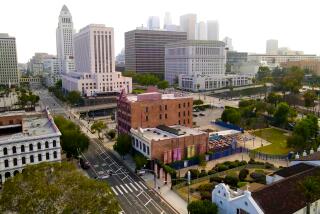McCarty Fights to Stop Diocese From Building Hall on Indian Graves
- Share via
Standing next to the ruins of the original Mission San Diego de Alcala and the Indian cemetery they contain, Councilwoman Judy McCarty vowed Friday to fight plans by the Roman Catholic diocese to build a hall on the site.
In a press conference held on mission property, McCarty said the city may challenge the diocese’s title to the land in order to save the “national treasure right here in San Diego.” But she acknowledged that the city has little hope of winning a legal challenge, and said she is counting on a public outcry to scrap the 10-year-old proposal.
San Diego Bishop Leo T. Maher criticized McCarty’s actions, arguing that the church had fulfilled its obligations to the Indians and scientists. McCarty “. . .is interfering with the mission of the church and with our religious rights,” he charged in a statement released Friday.
End of 3-Month Agreement
Archeologists, preservationists and descendants of mission Indians joined McCarty in criticizing the diocese’s project. Friday was the last day of a three-month archeological excavation that was negotiated between the diocese and the city of San Diego, and many of those involved in the dig now fear the arrival of construction crews on the site.
Eight of the 20 pits still contain human remains, according to ERC, the archeological company which conducted the dig. However, the state attorney general’s office has elicited a promise from the diocese to do nothing on the site until the bones are removed, said diocese spokesman William Finley. Failure to exhume human remains exposed during construction is a felony crime in California.
There are also problems on another front. Vandals damaged five human skulls on the dig Wednesday night, said Michael Wright, ERC executive vice president. The diocese was notified of the incident, Wright added. The police were not called in, said Finley, and each party blamed the other for not reporting the incident.
McCarty said she will introduce a resolution to the City Council Monday asking the city attorney to consider legal action against the project. But she conceded that a similar review of the city’s options last year yielded little. City planner Ron Buckley, of the Historical Sites Board, has said another possibility is a challenge based on President Abraham Lincoln’s deed of the property to the church “in public trust.” But McCarty said this was unlikely to succeed. “At this point, though, we are not counting anything out,” she said.
McCarty: ‘Unacceptable’
City Atty. John Witt said his staff would meet to analyze the issue, though he said he still favors another compromise with the diocese. But McCarty ruled out another such deal. “The church position is unacceptable,” she said.
Kumeyaay Indian spokesman Clarence Brown said the tribe will seek a court injunction as early as next week against further work on the site. The church project “is the same thing as putting swastikas on the walls of a Jewish building,” he said.
But the alliance between Indians and the archeologists is temporary, said Janet Bartel, president of the parish historical society. “I feel sorry for the Indians,” she said. “The archeologists will want to keep digging up the graves, church hall or not.” After witnessing McCarty’s press conference, Bartel said she doubts that the meeting hall will ever be built.
It would take at least several months to exhume the rest of the human remains from the eight pits, said anthropologist Florence Shipek, who has viewed the site.
In the meantime, church officials will meet next week to plan their next move, according to Finley. Despite McCarty’s appeals to Bishop-designate Robert H. Brom, the decision is still up to Bishop Maher and project head Msgr. Brent I. Eagan, church spokesmen said.
More to Read
Sign up for Essential California
The most important California stories and recommendations in your inbox every morning.
You may occasionally receive promotional content from the Los Angeles Times.













